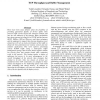Free Online Productivity Tools
i2Speak
i2Symbol
i2OCR
iTex2Img
iWeb2Print
iWeb2Shot
i2Type
iPdf2Split
iPdf2Merge
i2Bopomofo
i2Arabic
i2Style
i2Image
i2PDF
iLatex2Rtf
Sci2ools
112
click to vote
ISORC
2000
IEEE
2000
IEEE
TCP Throughput and Buffer Management
There have been many debates about the feasibility of providing guaranteed Quality of Service (QoS) when network traffic travels beyond the enterprise domain and into the vast unknown of the Internet. Many mechanisms have been proposed to bring QoS to TCP/IP and the Internet (RSVP, DiffServ, 802.1p). However, until these techniques and the equipment to support them become ubiquitous, most enterprises will rely on local prioritization of the traffic to obtain the best performance for mission critical and time sensitive applications. This work explores prioritizing critical TCP/IP traffic using a multi-queue buffer management strategy that becomes biased against random low priority flows and remains biased while congestion exists in the network. This biasing implies a degree of unfairness but proves to be more advantageous to the overall throughput of the network than strategies that attempt to be fair. Only two classes of services are considered where TCP connections are assigned to th...
Critical Tcp/ip Traffic | Distributed And Parallel Computing | ISORC 2000 | Low Priority Flows | Network Traffic |
Related Content
| Added | 31 Jul 2010 |
| Updated | 31 Jul 2010 |
| Type | Conference |
| Year | 2000 |
| Where | ISORC |
| Authors | Todd Lizambri, Fernando Duran, Shukri Wakid |
Comments (0)

